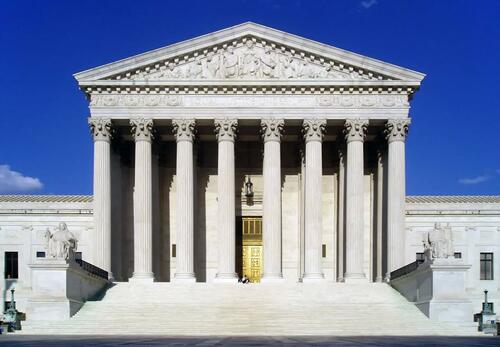
Below is my column on the growing attacks on the legitimacy of the Supreme Court after the decision to overturn Roe v. Wade. As the Court ends its term, Democratic leaders are calling for removing justices, packing the Court, and other extreme reactions to the decision in Dobbs v. Jackson Women’s Health Organization.
Here is the column:
For justices, the end of a Supreme Court term usually brings welcomed vacations and speaking engagements out of town. This week it seemed more like the justices were fleeing the jurisdiction with a mob at their heels. Six justices (and their homes) are targeted because they dared to interpret the Constitution in a way that is opposed by many in the political, media, and academic establishment. After the overturning of Roe v. Wade, many called for impeachments, court packing, and “disciplining” justices. What is chilling, however, is that these calls have not come from extremist groups but political and media figures who are challenging the very “legitimacy” of the Supreme Court.
The Madisonian democracy is based on the premise that, despite our factional divisions, the Constitution creates an interest in all groups in preserving the system. While the Constitution does not guarantee that your views will prevail in Congress or the courts, it has proven the most stable and successful democratic system in history. We are all invested in that system which has achieved transformative changes over time in our laws and our society.
The Constitution is neither poetic nor pretentious in its language. It was written by the ultimate wonk in Madison. It has only one thing to recommend it: we are still here. We have survived periods of war, economic collapse, and social discord that broke other systems.
Politicians and the press have thrived under this system and have historically defended its legitimacy even when demanding major changes in our laws. We are now witnessing a crisis of faith with the political and media establishment declaring the highest court to be illegitimate. All because they disagree with a constitutional interpretation adopted by the majority of its members.
Sen. Elizabeth Warren, D-Mass, has declared the Supreme Court illegitimate and has called to pack the Court for rending opinions against “widely held public opinion.”
Rep. Alexandria Ocasio-Cortez, D-N.Y., even questioned the institution’s value: “How much does the current structure benefit us? And I don’t think it does.” She has now demanded the impeachment of Justices Kavanaugh and Gorsuch based on the entirely false claim that they lied under oath in their confirmation hearings. After the Dobbs decision, Ocasio-Cortez demanded “there must be consequences” for the Court.
Other leaders like Sen. Jeanne Shaheen, D-N.H., issued a warning to the Supreme Court: Reaffirm Roe v. Wade or face a “revolution.”
The media has amplified these extreme calls. In the New York Times, columnist Jamelle Bouie wrote an outline of how Democrats could rein in the high court in a piece titled, “How to Discipline a Rogue Supreme Court.” He wrote that the Supreme Court does not exist above the constitutional system and added that the “rogue” court “cannot shield itself from the power of other branches.” Bouie’s discipline includes impeaching or removing justices as well as packing the court.
Notably, like many others demanding radical changes to the Court, Bouie previously advocated the change that is most responsible for creating the Court’s current composition. Like many liberals, Bouie demanded that the Senate kill the filibuster rule for Supreme Court nominees.
At the time, some of us warned the Democrats that the move was uniquely short-sighted and that they would rue the day that they took such a moronic step. As predicted, the Democrats soon found themselves in the minority without the protection of the filibuster rule and could not block nominees. They gained comparably little from the change given what they lost, including ultimately Roe v. Wade.
Rather than admit that their prior attack on the filibuster backfired, liberals are now demanding even more radical moves like a bad gambler at Vegas who just keeps doubling down in the hopes of winning a hand.
It does not matter that the Court is not as rigidly ideological or dysfunctionally divided as widely claimed. If anything, it has shown fewer divisions in most cases. Before the opinion, ABC admitted that “67% of the court’s opinions in cases argued during the term that ends this month have been unanimous or near-unanimous with just one justice dissenting.That compares to just 46% of unanimous or near-unanimous decisions during the 2019 term and the 48% average unanimous decision rate of the past decade.” Yet, after the decision, ABC’s legal analyst Terry Moran described the term as a “new era” of the “activist court.”
This crisis of faith is evident in other key constituencies in our system, including in our law schools. Law professors like Berkeley Dean Erwin Chemerinksy have called the justices “partisan hacks” while others have supported targeting the individual justices at their home. Georgetown Law Professor Josh Chafetz declared that “when the mob is right, some (but not all!) more aggressive tactics are justified.” Most recently, the dean and chancellor of University of California Hastings College of the Law David Faigman questioned the legitimacy of the Court after the ruling in Dobbs v. Jackson Women’s Health Organization.
Writing in his official capacity, Faigman went as far as to claim that “this decision turns back the clock not just to 1973, but to a century when women did not have the right to vote and were, largely, treated as property . . . the world today is so much less generous and inclusive than it was just yesterday. I tremble for my granddaughters.” Faigman declared that the “the Court itself, which is a product of political gerrymandering—raises basic questions regarding the legitimacy of the Court itself.”
From Congress to the press to academia, the very foundation of the Court is being challenged. What is notable is that these are also the voices of some of the most powerful figures in our society. Rather than seek to moderate the mob, they are fueling the rage with such reckless rhetoric. There are good-faith objections to this decision but those objections challenge the legitimacy of the holding, not the institution itself. As Benjamin Franklin noted “The U. S. Constitution doesn’t guarantee happiness, only the pursuit of it. You have to catch up with it yourself.”
Below is my column on the growing attacks on the legitimacy of the Supreme Court after the decision to overturn Roe v. Wade. As the Court ends its term, Democratic leaders are calling for removing justices, packing the Court, and other extreme reactions to the decision in Dobbs v. Jackson Women’s Health Organization.
Here is the column:
For justices, the end of a Supreme Court term usually brings welcomed vacations and speaking engagements out of town. This week it seemed more like the justices were fleeing the jurisdiction with a mob at their heels. Six justices (and their homes) are targeted because they dared to interpret the Constitution in a way that is opposed by many in the political, media, and academic establishment. After the overturning of Roe v. Wade, many called for impeachments, court packing, and “disciplining” justices. What is chilling, however, is that these calls have not come from extremist groups but political and media figures who are challenging the very “legitimacy” of the Supreme Court.
The Madisonian democracy is based on the premise that, despite our factional divisions, the Constitution creates an interest in all groups in preserving the system. While the Constitution does not guarantee that your views will prevail in Congress or the courts, it has proven the most stable and successful democratic system in history. We are all invested in that system which has achieved transformative changes over time in our laws and our society.
The Constitution is neither poetic nor pretentious in its language. It was written by the ultimate wonk in Madison. It has only one thing to recommend it: we are still here. We have survived periods of war, economic collapse, and social discord that broke other systems.
Politicians and the press have thrived under this system and have historically defended its legitimacy even when demanding major changes in our laws. We are now witnessing a crisis of faith with the political and media establishment declaring the highest court to be illegitimate. All because they disagree with a constitutional interpretation adopted by the majority of its members.
Sen. Elizabeth Warren, D-Mass, has declared the Supreme Court illegitimate and has called to pack the Court for rending opinions against “widely held public opinion.”
Rep. Alexandria Ocasio-Cortez, D-N.Y., even questioned the institution’s value: “How much does the current structure benefit us? And I don’t think it does.” She has now demanded the impeachment of Justices Kavanaugh and Gorsuch based on the entirely false claim that they lied under oath in their confirmation hearings. After the Dobbs decision, Ocasio-Cortez demanded “there must be consequences” for the Court.
Other leaders like Sen. Jeanne Shaheen, D-N.H., issued a warning to the Supreme Court: Reaffirm Roe v. Wade or face a “revolution.”
The media has amplified these extreme calls. In the New York Times, columnist Jamelle Bouie wrote an outline of how Democrats could rein in the high court in a piece titled, “How to Discipline a Rogue Supreme Court.” He wrote that the Supreme Court does not exist above the constitutional system and added that the “rogue” court “cannot shield itself from the power of other branches.” Bouie’s discipline includes impeaching or removing justices as well as packing the court.
Notably, like many others demanding radical changes to the Court, Bouie previously advocated the change that is most responsible for creating the Court’s current composition. Like many liberals, Bouie demanded that the Senate kill the filibuster rule for Supreme Court nominees.
At the time, some of us warned the Democrats that the move was uniquely short-sighted and that they would rue the day that they took such a moronic step. As predicted, the Democrats soon found themselves in the minority without the protection of the filibuster rule and could not block nominees. They gained comparably little from the change given what they lost, including ultimately Roe v. Wade.
Rather than admit that their prior attack on the filibuster backfired, liberals are now demanding even more radical moves like a bad gambler at Vegas who just keeps doubling down in the hopes of winning a hand.
It does not matter that the Court is not as rigidly ideological or dysfunctionally divided as widely claimed. If anything, it has shown fewer divisions in most cases. Before the opinion, ABC admitted that “67% of the court’s opinions in cases argued during the term that ends this month have been unanimous or near-unanimous with just one justice dissenting.That compares to just 46% of unanimous or near-unanimous decisions during the 2019 term and the 48% average unanimous decision rate of the past decade.” Yet, after the decision, ABC’s legal analyst Terry Moran described the term as a “new era” of the “activist court.”
This crisis of faith is evident in other key constituencies in our system, including in our law schools. Law professors like Berkeley Dean Erwin Chemerinksy have called the justices “partisan hacks” while others have supported targeting the individual justices at their home. Georgetown Law Professor Josh Chafetz declared that “when the mob is right, some (but not all!) more aggressive tactics are justified.” Most recently, the dean and chancellor of University of California Hastings College of the Law David Faigman questioned the legitimacy of the Court after the ruling in Dobbs v. Jackson Women’s Health Organization.
Writing in his official capacity, Faigman went as far as to claim that “this decision turns back the clock not just to 1973, but to a century when women did not have the right to vote and were, largely, treated as property . . . the world today is so much less generous and inclusive than it was just yesterday. I tremble for my granddaughters.” Faigman declared that the “the Court itself, which is a product of political gerrymandering—raises basic questions regarding the legitimacy of the Court itself.”
From Congress to the press to academia, the very foundation of the Court is being challenged. What is notable is that these are also the voices of some of the most powerful figures in our society. Rather than seek to moderate the mob, they are fueling the rage with such reckless rhetoric. There are good-faith objections to this decision but those objections challenge the legitimacy of the holding, not the institution itself. As Benjamin Franklin noted “The U. S. Constitution doesn’t guarantee happiness, only the pursuit of it. You have to catch up with it yourself.”







